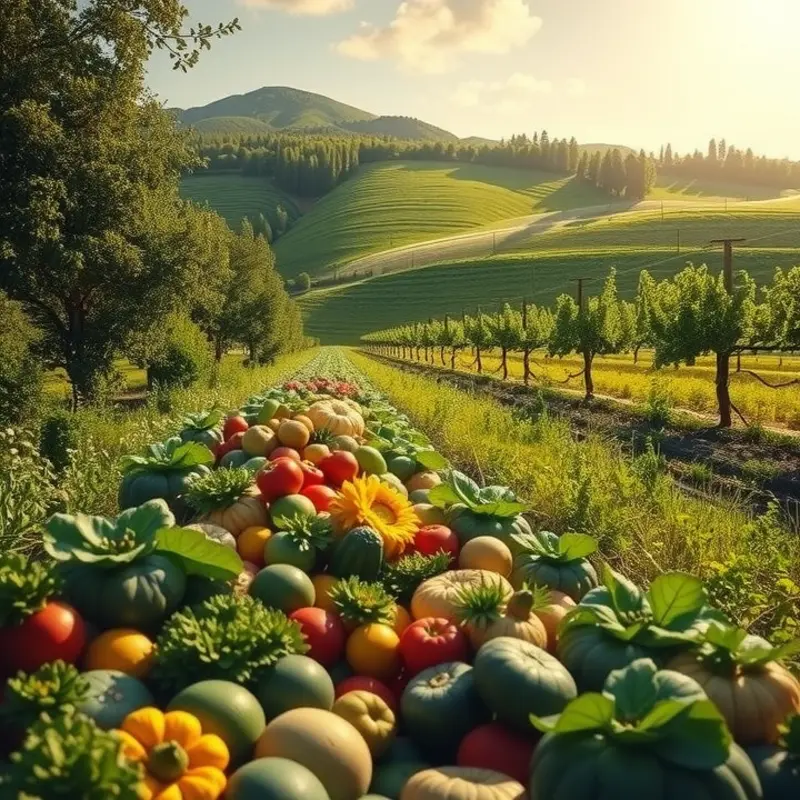Climate-smart eating is a growing movement that empowers individuals to make food choices that benefit both personal health and the planet. By shifting our diets to prioritize sustainable, local, and plant-based foods, we can make a meaningful impact in the fight against climate change. This guide highlights practical strategies to embrace eco-friendly eating habits, catering to those eager to contribute positively to the environment.
Understanding the Impact of Our Food Choices

Our daily food choices extend far beyond the dinner table. They shape the world around us in profound ways. As consumers, we play a crucial role in transforming food systems that significantly impact the planet. Conventional food production is one of the largest drivers of environmental degradation, primarily through its contribution to greenhouse gas emissions, deforestation, and biodiversity loss.
The agriculture sector is responsible for a significant portion of global greenhouse gas emissions. Livestock alone contributes to methane emissions, a potent greenhouse gas. By opting for plant-based meals over animal-based ones, we can significantly reduce our carbon footprint. Reducing meat consumption even for a few meals a week can have a tangible impact.
Deforestation is another major concern linked to food production. Forests are cleared to make way for agricultural land, often for livestock or monoculture crops such as soy and palm oil. These practices not only release carbon stored in trees but also destroy habitats, endangering countless species. Choosing products from sustainable and ethically managed sources can help protect these vital ecosystems.
Biodiversity loss is intertwined with our food systems. Monoculture farming reduces genetic diversity among plants and animals. This lack of diversity can lead to vulnerabilities, such as increased susceptibility to pests and diseases. Supporting local and organic agriculture helps maintain diverse ecosystems, integrating a variety of plant species and natural habitats. It also supports the resilience of entire food systems, allowing them to adapt to climate changes and other environmental stresses.
Educating ourselves about the true cost of our dietary choices is vital. Understanding where our food comes from and how it is produced can empower us to make more informed decisions. For instance, choosing seasonal and local produce can drastically cut the carbon emissions associated with food transport. These small decisions, made consistently over time, can cumulatively lead to massive positive changes.
Mindful consumption involves taking intentional actions that prioritize the environment. Reducing food waste, for example, is a critical step toward achieving sustainability. Uneaten food often ends up in landfills, producing methane as it decomposes. By planning meals carefully and storing foods correctly, we can contribute to minimizing this waste. Learn meal prep freezer tips to start conserving your resources and extend the shelf life of your groceries.
The impact of our food choices is not always immediately visible, but by shifting towards sustainable eating, we support healthier ecosystems and communities. A small shift in dietary habits can collectively generate a significant environmental benefit, pushing markets towards sustainability. Understanding and acting on these connections gives us power—power to protect and renew the very resources we depend on for survival.
Practical Tips for Climate-Smart Eating

Climate-smart eating is about making informed choices that contribute to the health of our planet. Opting for local and seasonal produce is a great starting point. This practice reduces the carbon footprint associated with transportation and storage of food. By buying what’s in season locally, you not only support your community but also enjoy fresher and tastier food.
Reducing meat and dairy consumption is another impactful step. Livestock farming is a major contributor to greenhouse gas emissions. Try integrating more plant-based meals into your diet. This doesn’t mean a complete overhaul overnight. Start with one or two vegetarian meals a week and gradually increase from there. Incorporating legumes, whole grains, nuts, and seeds can ensure you still meet nutritional needs while enjoying a varied diet.
Decreasing food waste is equally essential. Planning meals ahead of time can prevent over-purchasing and ensure ingredients don’t go unused. Consider keeping a list of recipes that make use of similar ingredients. This way, if you have leftovers or excess produce, you know exactly how to use them efficiently. Here are some quick meal planning strategies that can help streamline your approach.
When grocery shopping, bring reusable bags and buy in bulk to minimize packaging waste. Focus on buying whole foods rather than processed items to cut down on both packaging and energy used in production. Visiting local farmers’ markets is an excellent way to ensure you buy fresh and support sustainable practices.
Transitioning to a climate-smart diet may seem daunting, but with easy plant-based recipes, it can be simplified. Consider making a hearty lentil soup or a vibrant quinoa salad packed with seasonal veggies. Smoothies are another way to use ripening fruits that might otherwise go to waste.
By implementing these strategies, we can each play a part in transforming the food system one bite at a time. Small, consistent changes lead to long-term habits that benefit both our health and the environment. Embrace these practical steps and contribute to a sustainable future, proving that eco-friendly eating doesn’t have to be complicated.
Final words
Embracing climate-smart eating is a powerful way to take action for the planet. As each individual contributes to a more sustainable food system, we can collectively create a healthier environment. By prioritizing local, seasonal, and plant-based foods, we pave the way for a more sustainable future, reducing our ecological footprint and supporting biodiversity. Remember, every meal is an opportunity to nourish not just ourselves but also the Earth. Start small, stay committed, and inspire others to make similar choices for a positive impact.








